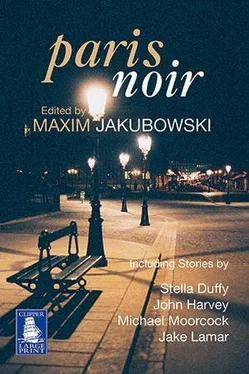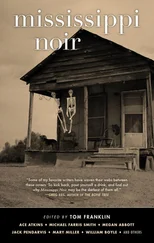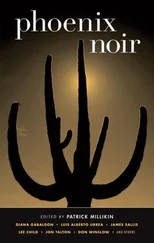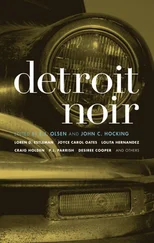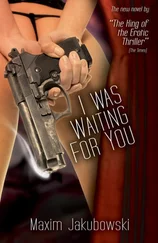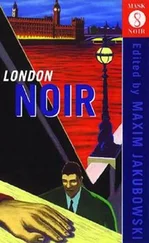Maxim Jakubowski - Paris Noir
Здесь есть возможность читать онлайн «Maxim Jakubowski - Paris Noir» весь текст электронной книги совершенно бесплатно (целиком полную версию без сокращений). В некоторых случаях можно слушать аудио, скачать через торрент в формате fb2 и присутствует краткое содержание. Жанр: Детектив, на английском языке. Описание произведения, (предисловие) а так же отзывы посетителей доступны на портале библиотеки ЛибКат.
- Название:Paris Noir
- Автор:
- Жанр:
- Год:неизвестен
- ISBN:нет данных
- Рейтинг книги:3 / 5. Голосов: 1
-
Избранное:Добавить в избранное
- Отзывы:
-
Ваша оценка:
- 60
- 1
- 2
- 3
- 4
- 5
Paris Noir: краткое содержание, описание и аннотация
Предлагаем к чтению аннотацию, описание, краткое содержание или предисловие (зависит от того, что написал сам автор книги «Paris Noir»). Если вы не нашли необходимую информацию о книге — напишите в комментариях, мы постараемся отыскать её.
Edited by Maxim Jakubowski, the stories range from quietly menacing to spectacularly violent, and include contributions from some of the most famous crime writers from both sides of the Atlantic, as well as the other side of the Channel.
Paris Noir — читать онлайн бесплатно полную книгу (весь текст) целиком
Ниже представлен текст книги, разбитый по страницам. Система сохранения места последней прочитанной страницы, позволяет с удобством читать онлайн бесплатно книгу «Paris Noir», без необходимости каждый раз заново искать на чём Вы остановились. Поставьте закладку, и сможете в любой момент перейти на страницу, на которой закончили чтение.
Интервал:
Закладка:
DAY 2
In a midnight-blue tracksuit, Zé jogs along the former towpath beside the canal. A few warehouses, silos and barges line the quay. Not a soul. He draws level with the Africans’ squat. A fence, broken in several places. Still nobody about. He pulls his tracksuit hood over his shaved head and slips through to the waste ground. A series of stony humps and dips overgrown with brambles, like a field of ruins dominated by the grey brick building, obscured at the bottom by brambles. From this side, everything looks dead. The ground- and first-floor windows are still bricked up with concrete breeze blocks and on the upper floors only a few small holes have been made here and there. Clearly the squatters are wary of the waste ground and are trying to keep it out.
Zé moves slowly and noiselessly, camouflaged by the undergrowth, and comes across a whole network of paths and hidey-holes dug into the ground, protected by cardboard, planks, and sometimes carpeting. You can bet that after dark, this sort of wild garden, so close to the dormitory suburbs, will be teeming with people. Ze looks for a hole that appears to be empty and finds one on an area of high ground near the motorway from which he can watch the building. He clears some space for himself with a few flat stones, wedges himself in and waits. The building looks deserted. In the late afternoon, Zé distinctly hears the noise of people flocking back to the squat and going about their usual business. In the openings of the facade he’s watching, he sees lights flickering. Then darkness falls and the waste ground comes alive. Life rises up from the canal, floats above the ground, as if immaterial. Rustling, whispering, half-glimpsed flames. Zé hopes he’s not in the path of the main tide of people and focuses on the facade. Sniff out any clandestine contacts between the squat and the waste ground. That’s his way in. He lights a joint, to blend in, and pulls his hood down over his eyes.
As the night’s very dark, for a few hours he concentrates on the sounds so as to chart the comings and goings, and thinks he’s identified more intense activity under the brambles at the farthest corner of the building. He doesn’t budge. He waits. Around 4 a.m., life begins to flow back towards the canal and dissolves into the night by osmosis.
Zé uncurls himself, dives under the brambles closest to the building and finds a clear path running its entire length. At ground level, the five bricked-up basement windows must open into the cellars. Zé stops in front of the fifth one, bricked up like the others, and prods the breeze blocks. Finding they’re loose, he pulls a knife from his pocket and inserts the blade between the rubble stones. They’re a snug fit, but not cemented in. Zé moves away quickly, and hides in a dip in the ground, keeping still again. Take time to think. I’ve found the front door. No doubt I’m sharing it with dealers I know nothing about. So I don’t know what I might find behind it. Don’t want to know. Too great a risk of being seen. Come back tomorrow, properly equipped, and give it a go, blind.
Around 5.30, the lights begin to come on again in the squat. Between the dealers leaving and the squatters waking, I have got a good half hour to act undisturbed. That’s plenty. Zé too makes his way back to the canal.
DAY 3
Back to the waste ground, same time, same clothes, to find the same hole and wait there. The routine, in other words. Zé’s brought an old rucksack, crammed full, and a sleeping bag. The hours tick by. Nothing out of the ordinary. Only, around midnight, a kid who’s already well out of it and really wants to hang out with ‘a grown-up’ and ‘possibly more’. Zé frightens him off with a few curses in Serbo-Croat and the kid doesn’t insist.
4.20 a.m. Zé gets up, walks quickly over to the fifth basement window. Crouching in front of it, from his rucksack he pulls a pair of rubber gloves, a balaclava and night-vision goggles, which he puts on. He inserts a flat hook between the breeze blocks and loosens them just like that, throws his rucksack through the window and drops down into the cellar. First surprise, he hits the ground sooner than expected. A huge underfloor space rather than a cellar. Barely room to stand up. Senses a presence in a corner: a horizontal shape beginning to sit up. In two strides, Zé’s on top of him, pinning him to the floor. He knocks him out with a punch to the chin. He finishes him off with a stone picked up from the ground. Quick, find the the trap door leading up to the ground floor.
Torch. Some kind of flimsy wooden partition gives way to his touch. Piles of rubbish. Towards the centre of the building, a few wooden cases full of wire jewellery, wooden statuettes and leather belts, street hawkers’ wares no doubt, wonderfully flammable material. And the trap door. A gentle push: it yields easily; glance around, I’m just under the main staircase.
The wooden staircase. Perfect. Zé lets the trap door close, hurriedly goes over to the body, drags it under the trap door, piles up the planks from the partition, the boxes full of stuff, the guy’s sleeping bag, syringe, needle, tourniquet, spoon, cotton wool, bottle of water and even a dose of smack: do the job properly. Sprinkles several litres of methylated spirits over the whole lot. Then takes a spirit stove out of his rucksack, lights it, throws it onto the sleeping bag and opens the trap door. The fire catches immediately. Zé picks up his rucksack, runs to the window, clambers up into the open air with no difficulty. He walks quickly down to the canal without looking back. He must get as far away as he can before the fire spreads to the upper floors. As he walks, he stuffs the balaclava, gloves and goggles into his rucksack, reaches the towpath and breaks into a run, like an early-morning jogger. He watches the building out of the corner of his eye. Judging by the façade, nothing’s happening. The fire hasn’t caught, did it burn itself out in the cellar? Not enough meths? He carries on jogging, keeping up the same pace. Just as the outline of the building vanishes behind the carcass of an abandoned cement silo, he hears a rising scream. Don’t turn around. Hot flush. That’s it, you did it. They chucked you out of their place, you chuck them out of yours. Nice work.
He keeps on running. A kilometre further on, the rucksack will sink to the bottom of the canal, in two kilometres, he’ll be back in his Clio and will drive straight down to Marseille. Tomorrow, he’ll be out of the country. The fire engulfs the cellar, a magnificent blaze sucked towards the stairwell, which grows scorchingly hot before the staircase bursts into flames in several places, crackling. The dangling naked electric wires catch fire and give off a smell of burning rubber which masks that of the corpse being slowly burned to cinders. Wreaths of grey and black smoke billow from the ground floor, spread over the motorway, rise to the roof. Men abruptly roused emerge to see what’s going on just as the first flight of stairs collapses in a shower of sparks. Screams. In a few seconds, the alarm’s raised and the whole building resounds with panic-filled shouts, jostling, stampeding. The fire spreads to the upper storeys – there’s little to hinder it, the doors have been ripped off and the curtains replacing them catch fire at the slightest gust. The women and children gather by the windows at either end of the building, the men try to halt the progress of the flames by blocking any opening with everything they can get their hands on; it’s a ludicrous battle which only feeds the flames. Gas stoves explode here and there. Women jump out of first-floor windows clutching their children. Others on the fourth and fifth floors fling bundles of clothes out of the windows, hover over the void, scream for help. The distraught squatters scatter onto the motorway slip road where traffic is at a standstill.
Читать дальшеИнтервал:
Закладка:
Похожие книги на «Paris Noir»
Представляем Вашему вниманию похожие книги на «Paris Noir» списком для выбора. Мы отобрали схожую по названию и смыслу литературу в надежде предоставить читателям больше вариантов отыскать новые, интересные, ещё непрочитанные произведения.
Обсуждение, отзывы о книге «Paris Noir» и просто собственные мнения читателей. Оставьте ваши комментарии, напишите, что Вы думаете о произведении, его смысле или главных героях. Укажите что конкретно понравилось, а что нет, и почему Вы так считаете.
